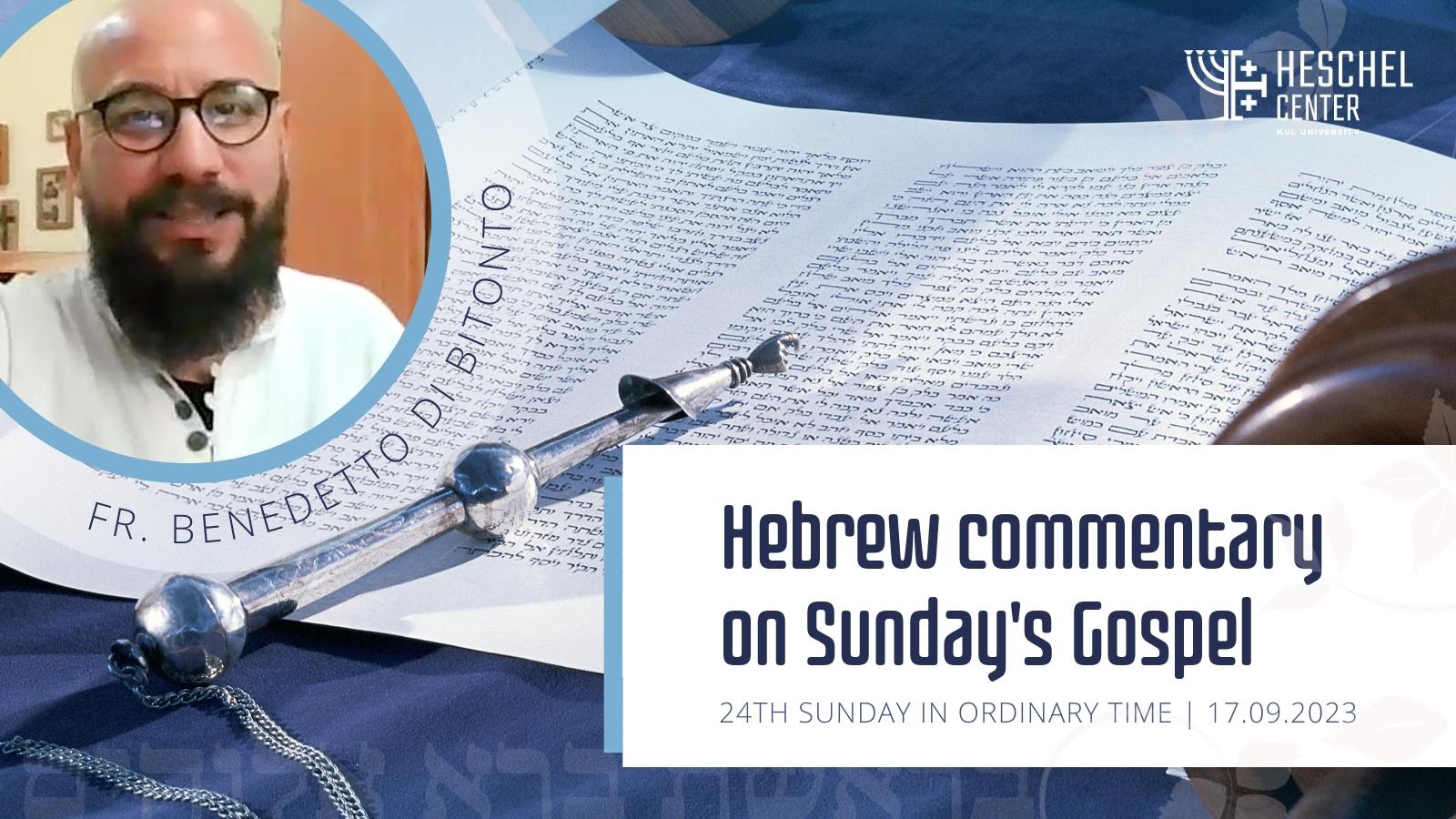Limit of forgiveness or forgiveness without limit?


Photo credit_KUL Heschel Center
The key to understanding Jesus’ answer to Peter’s question about the limit of forgiveness is the parable of the merciful king and the unmerciful debtor. Jesus reveals a whole new dimension to the approach to the law, the reality that by experiencing God’s boundless mercy and imitating it toward our brothers and sisters, we become like Him,” writes Fr. Benedetto Di Bitonto, Ph. D., of the Saint James Vicariate for Hebrew speaking Catholics in Israel, in a commentary for the Catholic University of Lublin’s Heschel Center for Sunday, September 17.
In Sunday’s Gospel, Peter asks Jesus a question about how many times he should forgive. This attitude comes from a desire to “establish boundaries, a clear knowledge of being in or out, right or wrong.” As Fr. Di Bitonto points out, it is at the same time evidence of Peter’s immaturity at this stage of his spiritual journey.
Responding to Peter’s question, Jesus tells a parable about a king who gave his servant the entire debt, even though the servant only asked for a postponement of payment. However, offered mercy, the debtor did not show it to his debtor, which deeply grieved the king and caused him anger, which he expressed in severe punishment.
Christians, through baptism, become priests, prophets, and kings, so “by practicing mutual forgiveness, opening their hearts to their neighbors, they can exercise their God-given royal authority,” Fr. Di Bitonto points out.
Fr. Benedetto Di Bitonto emphasizes that Jesus shows a new aspect of the Kingdom of Heaven when addressing the question of forgiveness. “It is a reality in which people forgive each other, knowing that we are all debtors, we have all been forgiven, and we still need forgiveness,” Fr. Di Bitonto writes.
Jesus’ attitude is an invitation to all to follow him. “Every day we can make the Kingdom of Heaven present on earth each time we remind ourselves of God’s mercy and love for us and his call for us to be like him,” Fr. Benedetto Di Bitonto concludes.
A full text of the commentary on the Heschel Center of the Catholic University of Lublin website:
https://heschel.kul.pl/limit-of-forgiveness-or-forgiveness-without-limit,art_103988.html
Forgiveness which may do harm to the victim and the abuser >>>
The life of St. Peter – love that overcame fear >>>
Ties bound on earth and in heaven >>>
Jesus points to pagan woman as example of faith >>>
The calming of the storm on the lake in the eyes of the first Jewish listeners >>>
The mountain of transfiguration – a place of my being with God >>>
Sometimes you have to go on a long journey to find the treasure hidden within yourself >>>
Revelation reserved for the foolish, or the provocation of Jesus >>>
Jesus on the Jewish value of spiritual service to the righteous >>>
The New Torah and Jesus as the new Moses and the new Joshua >>>
The day is short, the work is plentiful, and the people are insolent, and the reward is great >>>
Eucharist – New Manna, God present here and now >>>
Hebrew Commenary to the Gospel: Three Names of One God >>>
The Pentateuch’s prophets and Moses predicted the outpouring of the Holy Spirit >>>
The end which is a new beginning – about an ever-present God >>>
Paraclete – three meanings of the Greek word hidden in the Old Testament >>>
The first covenant of God with the Jews is still valid >>>
Selective listening to Scripture – the mistake of the disciples at Emmaus >>>
God’s mercy inscribed on the pages of the Old Testament >>>
After his resurrection, why did Jesus first appear to women? >>>
Passover – the celebration of freedom and faith >>>
The more we know about Passover, the more we can understand the Last Supper >>>
Why did Jesus let Lazarus die? >>>
Who sinned, the blind man or his parents? >>>
How did the seventh man change the life of the Samaritan woman? >>>
Who was transfigured on Mount Tabor – the disciples or Jesus? >>>
The Desert – A Blessing or a Curse? >>>
KUL Heschel Center: Misunderstandings over the „eye for an eye” principle >>>
Law, Prophets, iota – we need to examine the context to understand the meaning of Jesus’ words >>>
Heschel Center KUL: What do salt, light and the city on a mountain mean to us? >>>
Heschel Center KUL: Why did the disciples, becoming „fishers of men,” abandon their nets? >>>
Hebrew Commentary to the Sunday Gospel excerpt – 2nd Sunday in Ordinary Time; Year A >>>
Jewish Commentary on the Gospel >>>
Hebrew commentary on the first Sunday of the New Year Gospel >>>
Jewish commentary on the Christmas Gospel >>>
Hebrew commentary on the Gospel for the Fourth Sunday of Advent >>>



Dodaj komentarz